使役动词的用法详解(用))
英语 使役动词用法总结

英语使役动词用法总结英语中的使役动词(Causative Verbs)是用来表示某个人或事物被其他人或事物所控制或支配的动词,通常用于表达某件事情被他人或外界因素所促成或导致。
以下是英语中常见的使役动词及其用法:1. Have:表示某人被他人所控制或支配,例如:I had my car repaired yesterday.(昨天我让人修理了我的车。
)2. Get:表示某人被他人所促成或导致,例如:She got her hair cut at the salon.(她在发廊剪了头发。
)3. Make:表示某人被迫或被控制去做某事,例如:He made me finish my homework before dinner.(他让我在晚餐前完成作业。
)4. Let:表示某人被允许或被授权去做某事,例如:They let me use their computer.(他们允许我使用他们的电脑。
)5. Help:表示某人受到他人的帮助或协助,例如:She helped me with my luggage.(她帮我拿行李。
)6. Have someone do something:表示某人被他人所控制或支配去做某事,例如:I had my assistant finish the report.(我让我的助手完成了报告。
)7. Get someone to do something:表示某人被他人所促成或导致去做某事,例如:I got my friend to help me move.(我让我的朋友帮我搬家。
)8. Make someone do something:表示某人被迫或被控制去做某事,例如:My boss made me work overtime.(我老板让我加班。
)9. Let someone do something:表示某人被允许或被授权去做某事,例如:My parents let me stay out late.(我父母让我晚上出去晚些回家。
使役动词的用法及口诀

使役动词的用法及口诀一、使役动词的定义和分类使役动词是表示命令、请求、允许、禁止等含义的动词,通常分为以下三类:1.完全使役动词:指动词所表示的动作完全由宾语完成,例如“make、have、let、cause”等。
2.不完全使役动词:指动词所表示的动作部分由宾语完成,例如“get、put、keep、send”等。
3.感觉使役动词:指动词所表示的是主语对宾语的感觉,例如“see、hear、watch、observe”等。
二、使役动词的用法和搭配使役动词的用法和搭配多种多样,下面列举一些常见的用法和搭配:1.动词+宾语:使役动词后面接宾语,表示动作的对象。
例如:“make thephone ring”、“have the machine run”。
2.动词+宾语+宾补:使役动词后面接宾语和宾补,表示动作的结果或方式。
例如:“let the cat in”、“get the car fixed”。
3.动词+间接宾语+直接宾语:使役动词后面接间接宾语和直接宾语,表示动作的受益者和接受者。
例如:“send a letter to him”、“buy a book for her”。
4.情态动词+使役动词:情态动词后面接使役动词,表示情态的命令、请求、允许等含义。
例如:“should have the courage to do it”、“may let you go”。
三、使役动词的口诀和记忆技巧使役动词的记忆口诀如下:make有make do感觉生动抽象, 其它是可看见.get有get do感觉时态较特殊, 其它是可看见.let有let do感观抽象不难记, 其它是可看见.have有have do感观抽象不难记, 其它是可看见.四、使役动词的句型和语法规则使役动词在句型和语法规则上有一些特殊之处,下面列举一些常见的用法:1.使役动词的否定式和疑问式一般要借助助动词do或does。
例如:“Don’t make him cry”、“Did you let him go”。
使役动词的用法 详解

使役动词使役动词1.使役动词是表示使、令、让、帮、叫等意义的不完全及物动词,主要有leave.get.keep.make(使,令), let(让), help(帮助), have(有;让;从事;允许;拿)等。
2.使役动词后接受词,再接原形不定词作受词补语。
接宾语时,人称代词用宾格。
He made me(宾格) laugh.他使我发笑。
I let him go.我让他走开。
I helped him repair the car.我帮他修理汽车。
Please have him come here.请叫他到这里来。
3.使役动词还可以接过去分词作受词补语。
I have my hair cut every month.我每个月理发。
4.使役动词的被动语态的受词补语用不定词,不用原形不定词。
(主)He made me laugh.他使我笑了。
(被)I was made to laugh by him.我被他逗笑了。
使役动词有以下用法:a. have somebody do sth让某人去做某事I had him arrange for a car.b. have somebody doing sth.让某人持续做某事。
He had us laughing all through lunch.注意:用于否定名时,表示“允许”i won't have you running around in the house.我不允许你在家里到处乱跑。
小议“使役动词”的用法1. have sb do让某人干某事e.g:What would you have me do?have sb/sth doing 让某人或某事处于某种状态,听任e.g: I won't have women working in our company.The two cheats had the light burning all night long.have sth done让别人干某事,遭受到e.g:you 'd better have your teeth pulled out.He had his pocket picked.notes: "done"这个动作不是主语发出来的。
使役动词知识点详解(初中英语专项复习)3

使役动词知识点详解(初中英语专项复习)1.使役动词的定义使役动词是表示“使、令、让”等意义的词,主要有let(让)、have(叫、让)、make(使、让)等2.使役动词的用法①使役动词的宾语补足语若为动词不定式,则动词不定式省去toShe made her children wash their hands before eating.她要孩子们在吃东西前洗手。
②在“make+宾语+宾语补足语”结构中,宾补可以用名词、代词、不带to的动词不定式、过去分词、介词短语,从句等充当In 1849,he went to England and made London the base for his revolutionary work 1849年,他去了英国,并将伦敦作为他革命工作的基地。
(名词作宾补)What she said made the boy cry.她的话使那个男孩哭了起来。
(不带to的动词不定式作宾补)If Dr. Baker is in the hall, will he please make himself known to me?如果贝克博士在大厅的话,他能不能向我作一下自我介绍?(过去分词作宾补)Please make yourselves at home.请不要拘束。
(介词短语作宾补)He has made the company what it is today.他把公司弄成了今天这个样子。
(从句作宾补)③“have+宾语+宾语补足语”中的宾补可以用不带to的动词不定式、动词的ing形式、过去分词充当a.have sb. do sth.“请/让某人做某事”,make,let也有同样的用法。
The teacher had/made/let some students stay in the classroom after school.故学后,老师让一些学生留在了教室里。
b.have sb. /sth. doing“让/使某人做某事,让某物处于某状态”,其否定结构表示“不能让”“不允许”。
英语中使役动词的用法总结

英语中使役动词的用法总结英语中具有使役意义的动词较多,跟人们常常说的使役动词不是一个概念.通常我们说使役动词,指的是make, have, let这三个动词,它们在后接不定式作宾语补足语时要省去不定式符号to的特定用法.下面是英语中使役动词的用法总结,大家一起来看看吧!英语中使役动词的用法总结:1.have的用法1). have 宾语省to不定式:表示主语“要”“使”“让”宾语干某事,宾语和宾补之间是一种主动关系.而且还可以与情态动词will, would连用,不用于被动结构.The rich lady had the singer eat with his servants.I will have him come and help you.2). have 宾语现在分词:表示让某人或物连续进行某动作或处于某状态中,宾语和宾补是一种主动关系.亦可转化为“劝说,鼓励”宾语干某事.The two cheats had the lights burning all night long.He had us waiting for him three hours yesterday.I have them all talking to each other in English. 我鼓励他们用英语交谈.3). have 宾语过去分词:表示主语的主观意志,即主语让别人为自己完成某事,宾语和宾补是动宾关系.还可以表示主语遭受到来利或不测的事.Tom said he had had his TV set repaired.Tom had his wallet stolen on the bus yesterday.“别人”在句中一般不出现,这是它与结构1)的区别所在.试比较:Have you washed your clothes? 你洗了衣服了吗?(自己洗)Have you had your clothes washed? 你叫人洗了衣服了吗?(别人洗)4). have 宾语形容词/副词/介词短语作宾补Please have your tickets ready.The Emperor had nothing on.I am sure I’ll have him in the argument.2.let的用法1). let 宾语省to不定式:表示主语“要”“使”“让”宾语干某事,宾语和宾补之间是一种主动关系,罕用于被动语态.有时也可指一种假设.let后不能接现在分词,过去分词作宾补.Let them stay in the classroom and do their exercises themselves.Let AB be equal to CD. 假设AB等于CD.2). let 宾语副词/介词短语作宾补Let me in and let them out.Who let you into the building?3.make的用法1). make 宾语省to不定式:表示主语“要”“使”“让”宾语干某事,宾语和宾补之间是一种主动关系.此结构常用被动结构.make后不接现在分词作宾补.The teacher made the naughty boy stand there for an hour.The naughty boy was made to stand there for an hour.2).make 宾语过去分词,此结构中的宾语指人时常用到反身代词.He raised his voice to make himself heard.Can you easily make yourself understood in English?They will make an important plan known to the public soon.3). make 宾语形容词,宾语亦可是从句.The news made her happy.He made it clear that he objected to the proposal.三大使役动词make、have、get怎么区别:在英语学习中主要有三大使役动词——make、have和get。
初中英语“使役动词”及其用法汇总

初中英语“使役动词”及其用法汇总使役动词是用来表示主语让或者使其他人或者事物做一些动作的动词。
常用的使役动词有:let、make、have、get。
1. let:- 用法一:let后面接宾语或者宾语从句,表示“让人做事”。
- They let us go into the stadium.- My parents let me use their car for the weekend.- 用法二:let后面接不定式,表示“让人做事”。
- Please let me help you with your homework.- She let her children play in the park.2. make:- 用法一:make后面接宾语加原形动词,表示“强迫人做事”。
- My teacher made me stay after school.- The rain made the game get canceled.- 用法二:make后面接宾语加形容词,表示“使人处于其中一种状态”。
- The loud noise made me very nervous.3. have:- 用法一:have后面接宾语加原形动词,表示“让人做事”。
- She had her hair cut at a salon.- 用法二:have后面接宾语加现在分词,表示“使人处于其中一种状态”。
- I have my friends waiting for me outside.- She had her car repaired by a mechanic.4. get:- 用法一:get后面接宾语加过去分词,表示“让人做事”。
- She got her husband to fix the leaky faucet.- I got my hair cut yesterday.- 用法二:get后面接宾语加形容词,表示“使人处于其中一种状态”。
使役动词的用法
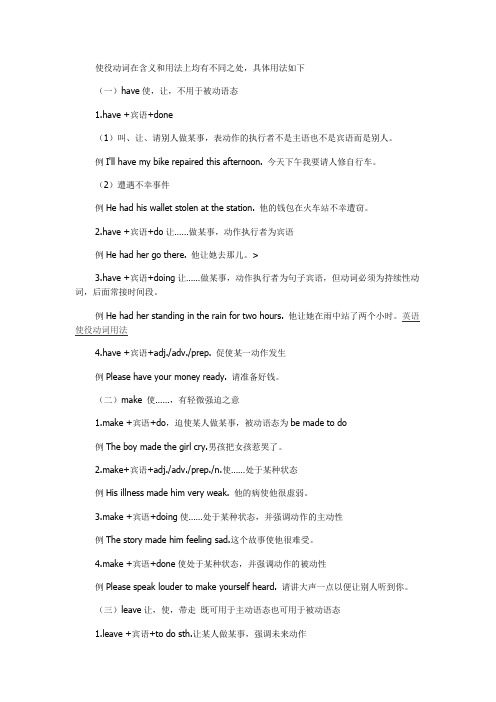
使役动词在含义和用法上均有不同之处,具体用法如下(一)have使,让,不用于被动语态1.have +宾语+done(1)叫、让、请别人做某事,表动作的执行者不是主语也不是宾语而是别人。
例I'll have my bike repaired this afternoon. 今天下午我要请人修自行车。
(2)遭遇不幸事件例He had his wallet stolen at the station. 他的钱包在火车站不幸遭窃。
2.have +宾语+do让……做某事,动作执行者为宾语例He had her go there. 他让她去那儿。
>3.have +宾语+doing让……做某事,动作执行者为句子宾语,但动词必须为持续性动词,后面常接时间段。
例He had her standing in the rain for two hours. 他让她在雨中站了两个小时。
英语使役动词用法4.have +宾语+adj./adv./prep. 促使某一动作发生例Please have your money ready. 请准备好钱。
(二)make 使……,有轻微强迫之意1.make +宾语+do,迫使某人做某事,被动语态为be made to do例The boy made the girl cry.男孩把女孩惹哭了。
2.make+宾语+adj./adv./prep./n.使……处于某种状态例His illness made him very weak. 他的病使他很虚弱。
3.make +宾语+doing使……处于某种状态,并强调动作的主动性例The story made him feeling sad.这个故事使他很难受。
4.make +宾语+done使处于某种状态,并强调动作的被动性例Please speak louder to make yourself heard. 请讲大声一点以便让别人听到你。
(免费)使役动词的用法 详解

使役动词使役动词1.使役动词是表示使、令、让、帮、叫等意义的不完全及物动词,主要有leave.get.keep.make(使,令), let(让), help(帮助), have(有;让;从事;允许;拿)等。
2.使役动词后接受词,再接原形不定词作受词补语。
接宾语时,人称代词用宾格。
He made me(宾格) laugh.他使我发笑。
I let him go.我让他走开。
I helped him repair the car.我帮他修理汽车。
Please have him come here.请叫他到这里来。
3.使役动词还可以接过去分词作受词补语。
I have my hair cut every month.我每个月理发。
4.使役动词的被动语态的受词补语用不定词,不用原形不定词。
(主)He made me laugh.他使我笑了。
(被)I was made to laugh by him.我被他逗笑了。
使役动词有以下用法:a. have somebody do sth让某人去做某事I had him arrange for a car.b. have somebody doing sth.让某人持续做某事。
He had us laughing all through lunch.注意:用于否定名时,表示“允许”i won't have you running around in the house.我不允许你在家里到处乱跑。
小议“使役动词”的用法1. have sb do让某人干某事e.g:What would you have me do?have sb/sth doing 让某人或某事处于某种状态,听任e.g: I won't have women working in our company.The two cheats had the light burning all night long.have sth done让别人干某事,遭受到e.g:you 'd better have your teeth pulled out.He had his pocket picked.notes: "done"这个动作不是主语发出来的。
6大使役动词的用法

6大使役动词的用法在英语学习中,使役动词是一类非常重要且常用的动词。
它们具有独特的用法和含义,能够生动地表达让某人做某事或者使某物处于某种状态。
今天,咱们就来详细聊聊 6 个常见的使役动词:make、let、have、get、help 和 cause 的用法。
先来说说“make”。
“make”这个词啊,是我们最常见的使役动词之一。
它的常见用法是“make +宾语+动词原形”,意思是“使某人做某事”。
比如说,“The boss made the workers work overtime”(老板让工人们加班。
)在这个句子里,“workers”是宾语,“work”是动词原形,“make”就起到了让“workers”去“work”的作用。
但要注意哦,如果在被动语态中,就得变成“be made to do”的形式,像“The workers were made towork overtime by the boss”接下来是“let”。
“let”的用法相对简单些,通常是“let +宾语+动词原形”,表示“允许某人做某事”。
比如,“Let me go”(让我走。
)“let”这个词,语气比较温和,没有“make”那么强硬。
再看看“have”。
“have”作为使役动词时,常见的结构有“have +宾语+动词原形”和“have +宾语+过去分词”。
“have +宾语+动词原形”表示“让某人做某事”,例如,“I'll have him come here”(我会让他来这儿。
)而“have +宾语+过去分词”则表示“使某事被做”,像“He had his hair cut”(他理发了。
)这里的“hair”和“cut”之间是被动关系。
“get”也是个常用的使役动词。
“get +宾语+动词不定式”,意思是“使某人做某事”,例如,“I got him to help me”(我让他帮助我。
)它还有“get +宾语+现在分词”的用法,表示“使某人或某物处于某种状态”,比如,“The joke got us laughing”(这个笑话让我们大笑起来。
关于英语语法中使役动词的用法详细分析

关于英语语法中使役动词的用法详细分析使役动词在英语语法中是属于一个比较难的知识点,但如果你能够在英语写作中用上它的话,会让你的作文增分不少,今天就让我们来好好学习一下吧。
使役意义状态动词get, leave, set, send, keep, drive, etc.常用于复合结构中)1. get:使成为/变得某种状态或结果。
I can’t get the old radio to work.我无法让那旧收音机工作起来。
(接带to不定式作宾补)Can you really get that old car going again?你真能让那旧车运转起来吗?The farmer got his planting done before the rain came.那农民在雨季前完成了种植。
He got his wrist broken.他折断了手腕。
(主语发生了不幸的事)She soon got the children ready for school.她迅速使孩子们做好了上学准备。
2. leave:使保持/处于某种状态Leave your hat and coat in the hall.把帽子和外套放在大厅里。
Did you leave the doors and windows firmly fastened?你把门窗紧紧锁上了吗?Always leave things where you can find them again.总应把东西放在能再次找到的地方。
Who left that window open?谁让窗户开着?Don’t leave him waiting outside in the rain.别让他在外面雨中等待。
Leave somebody / something alone.不要干涉某人或某事。
3. set:使某人或某物处于或达到某种特殊的状态或关系set somebody at his ease 使某人安逸/舒适/心情放松set something in order 使某物井然有序set somebody free / at liberty 使某人获得自由,释放(犯人等)It’s time we set the machine going. 是我们发动机器的时候了。
初中英语“使役动词”及其用法汇总

初中英语“使役动词”及其用法汇总1. make:- make + 宾语 + 动词原形:使人做事- make + 宾语 + 形容词:使人感到其中一种情绪或状态- make + 宾语 + 名词:使人成为其中一种身份或角色例句:- My mother made me clean my room.(妈妈让我打扫房间)- The movie made me cry.(这部电影让我哭了)- The teacher made him the monitor.(老师让他当班长)2. let:- let + 宾语 + 动词原形:让人做事- let + 宾语 + 名词:让人成为其中一种身份或角色例句:- My parents let me go to the party.(我父母让我去参加晚会)- The coach let him join the team.(教练让他加入球队)3. have:- have + 宾语 + 动词过去分词:让人做事- have + 宾语 + 形容词:使人拥有其中一种特征或性质例句:- They had me finish the report by tomorrow.(他们让我明天之前完成报告)- His success had the whole family proud.(他的成功使全家都感到骄傲)4. get:- get + 宾语 + 动词原形:让人做事- get + 宾语 + 形容词:使人处于其中一种状态例句:- I got him to help me with my homework.(我让他帮我做作业)- The cold weather got me sick.(寒冷的天气让我生病了)5. help:- help + 宾语 + 动词原形:帮助人做事例句:。
6大使役动词的用法
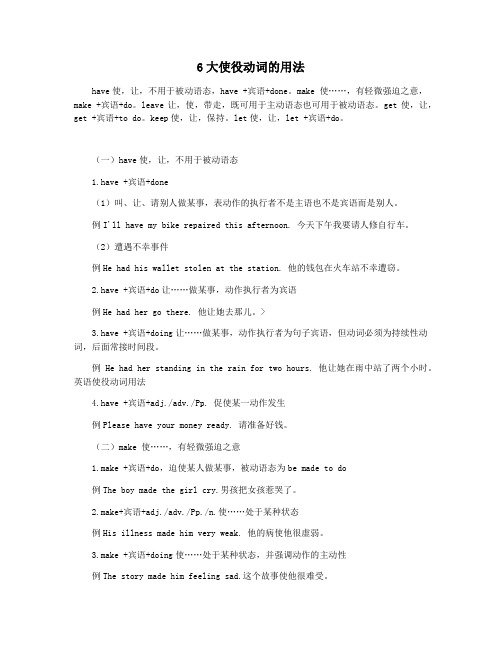
6大使役动词的用法have使,让,不用于被动语态,have +宾语+done。
make 使……,有轻微强迫之意,make +宾语+do。
leave让,使,带走,既可用于主动语态也可用于被动语态。
get使,让,get +宾语+to do。
keep使,让,保持。
let使,让,let +宾语+do。
(一)have使,让,不用于被动语态1.have +宾语+done(1)叫、让、请别人做某事,表动作的执行者不是主语也不是宾语而是别人。
例I'll have my bike repaired this afternoon. 今天下午我要请人修自行车。
(2)遭遇不幸事件例He had his wallet stolen at the station. 他的钱包在火车站不幸遭窃。
2.have +宾语+do让……做某事,动作执行者为宾语例He had her go there. 他让她去那儿。
>3.have +宾语+doing让……做某事,动作执行者为句子宾语,但动词必须为持续性动词,后面常接时间段。
例He had her standing in the rain for two hours. 他让她在雨中站了两个小时。
英语使役动词用法4.have +宾语+adj./adv./Pp. 促使某一动作发生例Please have your money ready. 请准备好钱。
(二)make 使……,有轻微强迫之意1.make +宾语+do,迫使某人做某事,被动语态为be made to do例The boy made the girl cry.男孩把女孩惹哭了。
2.make+宾语+adj./adv./Pp./n.使……处于某种状态例His illness made him very weak. 他的病使他很虚弱。
3.make +宾语+doing使……处于某种状态,并强调动作的主动性例The story made him feeling sad.这个故事使他很难受。
使役动词的用法详解

使役动词使役动词1.使役动词是表示使、令、让、帮、叫等意义的不完全及物动词,主要有使,令), let(让), help(帮助), have(有;让;从事;允许;拿)等。
2.使役动词后接受词,再接原形不定词作受词补语。
接宾语时,人称代词用宾格。
He made me(宾格) laugh.他使我发笑。
I let him go.我让他走开。
I helped him repair the car.我帮他修理汽车。
Please have him come here.请叫他到这里来。
3.使役动词还可以接过去分词作受词补语。
I have my hair cut every month.我每个月理发。
4.使役动词的被动语态的受词补语用不定词,不用原形不定词。
(主)He made me laugh.他使我笑了。
(被)I was made to laugh by him.我被他逗笑了。
使役动词有以下用法:a. have somebody do sth让某人去做某事I had him arrange for a car.b. have somebody doing sth.让某人持续做某事。
He had us laughing all through lunch.注意:用于否定名时,表示“允许”i won't have you running around in the house.我不允许你在家里到处乱跑。
小议“使役动词”的用法1. have sb do让某人干某事:What would you have me dohave sb/sth doing 让某人或某事处于某种状态,听任: I won't have women working in our company.The two cheats had the light burning all night long.have sth done让别人干某事,遭受到:you 'd better have your teeth pulled out.He had his pocket picked.notes: "done"这个动作不是主语发出来的。
英语使役动词用法详解
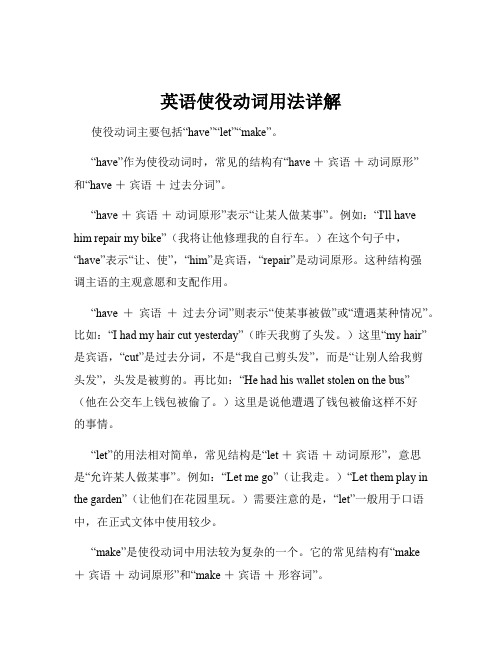
英语使役动词用法详解使役动词主要包括“have”“let”“make”。
“have”作为使役动词时,常见的结构有“have +宾语+动词原形”和“have +宾语+过去分词”。
“have +宾语+动词原形”表示“让某人做某事”。
例如:“I'll have him repair my bike”(我将让他修理我的自行车。
)在这个句子中,“have”表示“让、使”,“him”是宾语,“repair”是动词原形。
这种结构强调主语的主观意愿和支配作用。
“have +宾语+过去分词”则表示“使某事被做”或“遭遇某种情况”。
比如:“I had my hair cut yesterday”(昨天我剪了头发。
)这里“my hair”是宾语,“cut”是过去分词,不是“我自己剪头发”,而是“让别人给我剪头发”,头发是被剪的。
再比如:“He had his wallet stolen on the bus”(他在公交车上钱包被偷了。
)这里是说他遭遇了钱包被偷这样不好的事情。
“let”的用法相对简单,常见结构是“let +宾语+动词原形”,意思是“允许某人做某事”。
例如:“Let me go”(让我走。
)“Let them play in the garden”(让他们在花园里玩。
)需要注意的是,“let”一般用于口语中,在正式文体中使用较少。
“make”是使役动词中用法较为复杂的一个。
它的常见结构有“make+宾语+动词原形”和“make +宾语+形容词”。
“make +宾语+动词原形”表示“迫使某人做某事”,语气比较强烈。
例如:“The boss made the workers work long hours”(老板迫使工人们长时间工作。
)这里“workers”是宾语,“work”是动词原形,强调老板的强制作用。
“make +宾语+形容词”表示“使某人/某物处于某种状态”。
比如:“The news made him sad”(这个消息使他伤心。
使役动词用法汇总
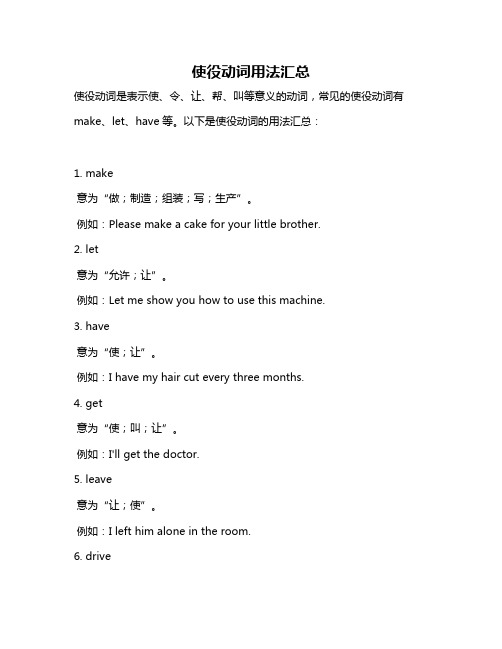
使役动词用法汇总使役动词是表示使、令、让、帮、叫等意义的动词,常见的使役动词有make、let、have等。
以下是使役动词的用法汇总:1. make意为“做;制造;组装;写;生产”。
例如:Please make a cake for your little brother.2. let意为“允许;让”。
例如:Let me show you how to use this machine.3. have意为“使;让”。
例如:I have my hair cut every three months.4. get意为“使;叫;让”。
例如:I'll get the doctor.5. leave意为“让;使”。
例如:I left him alone in the room.6. drive意为“驾驶;驱赶”。
例如:The car won't start. I think someone is trying to steal it. Let me drive it away.7. send意为“派;发送”。
例如:Send the letter by airmail.8. tell意为“告诉;讲述”。
例如:He told me the news.9. order意为“命令;点(菜)”。
例如:He ordered a pizza for lunch.10. arrive意为“到达;抵达”。
例如:I arrived in Beijing at 10 o'clock yesterday morning.11. allow意为“允许;准许”。
例如:The doctor won't allow him to go to work.12. permit意为“允许;许可”。
例如:The government doesn't permit the use of chemical weapons.13. support意为“支持;帮助”。
高中英语使役动词用法总结归纳(最新最全)
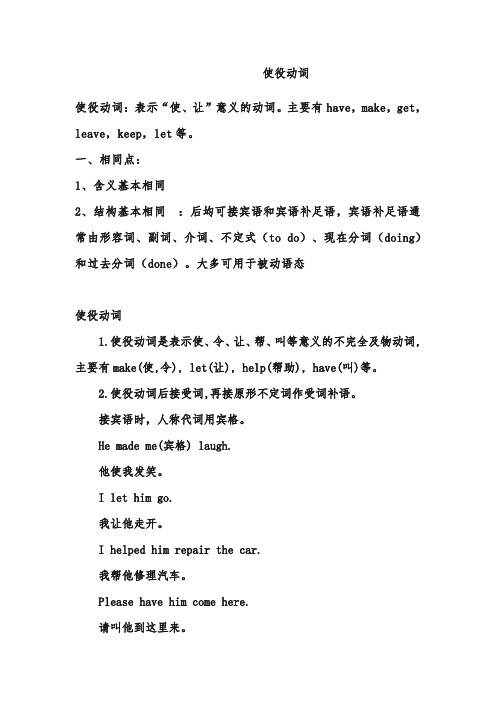
使役动词使役动词:表示“使、让”意义的动词。
主要有have,make,get,leave,keep,let等。
一、相同点:1、含义基本相同2、结构基本相同:后均可接宾语和宾语补足语,宾语补足语通常由形容词、副词、介词、不定式(to do)、现在分词(doing)和过去分词(done)。
大多可用于被动语态使役动词1.使役动词是表示使、令、让、帮、叫等意义的不完全及物动词,主要有make(使,令), let(让), help(帮助), have(叫)等。
2.使役动词后接受词,再接原形不定词作受词补语。
接宾语时,人称代词用宾格。
He made me(宾格) laugh.他使我发笑。
I let him go.我让他走开。
I helped him repair the car.我帮他修理汽车。
Please have him come here.请叫他到这里来。
3.使役动词还可以接过去分词作受词补语。
I have my hair cut every month.我每个月理发。
4.使役动词的被动语态的受词补语用不定词,不用原形不定词。
(主)He made me laugh.他使我笑了。
(被)I was made to laugh by him.我被他逗笑了。
使役动词有以下用法:a. have somebody do sth让某人去做某事I had him arrange for a car.b. have somebody doing sth.让某人持续做某事。
He had us laughing all through lunch.注意:用于否定名时,表示“允许”i won't have you running around in the house.我不允许你在家里到处乱跑。
小议“使役动词”的用法1. have sb do 让某人干某事e.g:What would you have me do?have sb/sth doing 让某人或某事处于某种状态,听任e.g: I won't have women working in our company.The two cheats had the light burning all night long.have sth done 让别人干某事,遭受到e.g:you 'd better have your teeth pulled out.He had his pocket picked.notes: "done"这个动作不是主语发出来的。
- 1、下载文档前请自行甄别文档内容的完整性,平台不提供额外的编辑、内容补充、找答案等附加服务。
- 2、"仅部分预览"的文档,不可在线预览部分如存在完整性等问题,可反馈申请退款(可完整预览的文档不适用该条件!)。
- 3、如文档侵犯您的权益,请联系客服反馈,我们会尽快为您处理(人工客服工作时间:9:00-18:30)。
使役动词的用法详解使役动词1.使役动词是表示使、令、让、帮、叫等意义的不完全及物动词,主要有leave.get.keep.make(使,令),let(让),help(帮助), have(有;让;从事;允许;拿)等。
2.使役动词后接受词,再接原形不定词作受词补语。
接宾语时,人称代词用宾格。
He made me(宾格)laugh.他使我发笑。
I let him go.我让他走开。
I helped him repair the car.我帮他修理汽车。
Please have him come here.请叫他到这里来。
3.使役动词还可以接过去分词作受词补语。
I have my hair cut every month.我每个月理发。
4.使役动词的被动语态的受词补语用不定词,不用原形不定词。
(主)He made me laugh.他使我笑了。
(被)I was made to laugh by him.我被他逗笑了。
使役动词有以下用法:a.have somebody do sth让某人去做某事I had him arrange for a car.b.have somebody doing sth.让某人持续做某事。
He had us laughing all through lunch.注意:用于否定名时,表示“允许”i won't have you running around in the house.我不允许你在家里到处乱跑。
“使役动词”的用法1.have sb do让某人干某事e.g:What would you have me do?have sb/sth doing让某人或某事处于某种状态,听任e.g:I won't have women working in our company. The two cheats had the light burning all night long. have sth done让别人干某事,遭受到e.g:you'd better have your teeth pulled out.He had his pocket picked.notes:"done"这个动作不是主语发出来的。
2.make sb do sth让某人干某事e.g:They made me repeat the story.What makes the grass grow?notes:I was made to repeat the story.make sb/sth done/adj./ne.g.The news made him happy.He couldn't make himself heard above the noise of the traffic.His actions made him universally respected.He made her his wife.3.get sb to do使某人干某事e.g:I can't get anyone to do the work properly.get sth done让别人干某事e.g:I must get my hair cut.Can you get the work finished in time?4.leave sb to do sth让某人干某事e.g:We left him to paint the gate.I'll leave you to settle all the business.leave sb doing让继续处于某种状态e.g:Don't leave her waiting outside in the rain.We left him painting the gate.leave sth done/adj./prep.phrasee.g:Please excuse me if I have left any of your questions unanswered.His illness has left him weak.I was left with a ray of hope.使役性动词(Causative Verb)1.make/have/let+sb+do sth.2.get/set/leave+sb to do/doing sth.(一)have使,让,不用于被动语态.have+宾语+done(1)叫、让、请,致使别人做某事,动作的执行者不是主语也不是宾语而是别人。
(强调主观的意志,即主语的意志致使某事发生或被做到)—I’ll have my bike repaired this afternoon.今天下午我要请人修自行车。
—I have my hair cut every month.我每个月都理发。
表示主观意志的have也可以用get代替,例如:—Where can I get(have)this printed?我在哪里能(找人)把这份东西打印出来呢?(2)遭遇不幸事件(与主观意志完全无关)—He had his wallet stolen at the station.他的钱包在火车站不幸遭窃。
—He has his leg broken in a fall.他的腿摔断了。
2.have+宾语+do让……做某事,动作执行者为宾语—He had her go there.他让她去那儿。
—I have my children clean the house before you arrive.在你们来之前,我让孩子们把屋子打扫干净了。
这个结构中have有时也可以用get代替,但这时后面的动词不定式需带to,例如:—I got him to write a letter to my boss.我要他写一封信给我的雇主。
3.have+宾语+adj.(形容词)/adv.(副词)/prep.(介词)促使某一动作发生,或使役动作产生的变化结果或状态。
—Please have your money ready.请准备好钱。
4.have+宾语+doing让……持续做某事,或处于某种状态。
动作执行者为句子宾语,但动词必须为持续性动词,后面常接时间段。
—He had her standing in the rain for two hours.他让她在雨中站了两个小时。
或表示动作执行者打算做的事或预期的目标。
—We’ll soon have your car going again.很快我们就会让你的车从新启动起来的。
还可以表示不愿引起某种后果—Don't shout!you'll have the neighbours complaining.别大声嚷!你会遭四邻抱怨的。
注意:用于否定句时,表示“允许”—I won’t have you smoking in the sitting room.我不允许你在起居室抽烟。
(二)make使……(有轻微强迫之意)1.make+宾语+do迫使某人做某事,被动语态为be made to do—The boy made the girl cry.男孩把女孩惹哭了。
—The girl was made to cry by the boy.女孩被男孩惹哭了。
(被动)2.make+宾语+adj./adv./prep.使……处于某种状态,使变得……—His illness made him very weak.他的病使他很虚弱。
—This boring soap opera made me sleepy.这无聊的肥皂剧让我想睡觉。
3.make+宾语+doing使……处于某种状态,强调动作的主动性—The story made him feeling sad.这个故事使他很难受。
—The bad weather made me staying at home yesterday.昨天,坏天气是我一天都呆在家里。
4.make+宾语+done使……处于某种状态,强调动作的被动性—Please speak lo uder to make yourself heard.请讲大声一点以便让别人听到你。
—The heavy bag made the chair broken.这个重重的包把椅子压坏了。
5.make+宾语+n.使……成为……—We made him the leader of the team.我们让他当我们的队长。
—She made her diary her best friend.她把日记当做她最好的朋友。
(三)leave让,使,带走既可用于主动语态也可用于被动语态1.leave+宾语+to do sth.让某人做某事,强调未来动作—Leave him to do it himself.让他自个儿去做这件事吧。
2.leave+宾语+doing让某人做某事,或继续处于某种状态,强调当时正在发生的动作—What he said left me thinking deeply.他的话使我陷入了沉思。
—Don’t leave her waiting outside in the rain.外面下雨,别让她在外面等了。
3.leave+宾语+done使……处于某种被动状态,强调动作的被动性—We can’t leave such an important matter unfinished.我们不能让这样一件重要的事半途而废。
4.leave宾语+adj./adv./prep.使……处于某一特定状态—W ho left the door open?谁让门开着?—Don’t leave the door unlocked.别忘了锁门。
(四)get使,让1.get+宾语+to do让……做某事,强调未来性动作—He got his brother to help him.他让他的兄弟帮助他。
2.get+宾语+done让……被做,强调被动性动作—He got the car started.他发动了小汽车。
3.get+宾语+d oing让……做某事,强调正在进行的动作,或表示动作执行者打算做的事或预期的目标。
—She got her bike running very fast.她把自行车骑得飞快。
表示动作执行者打算做的事或预期的目标—If you can get him talking,your problem is solved.如果你能让他开口,你的问题就解决了。
4.get+宾语+adj./adv./prep.使……发生—Please get your tickets ready.请准备好票。
